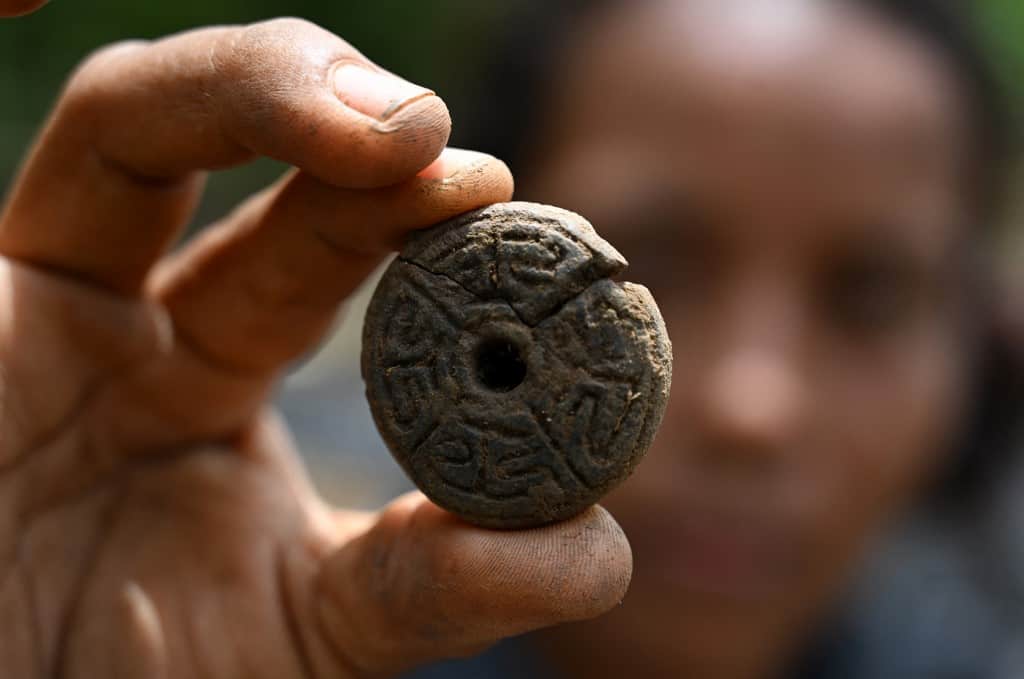With brushes and trowels, a team of indigenous women digs into a layer of soil in the middle of the Colombian jungle. Coordinated by a sort of Italian Indiana Jones, they reveal the archaeological vestiges of the first Spanish city in America founded on mainland.
What appears to be an old stone dock emerges from the earth to the rhythm of the tap, tap, tap of shovels against rocks. It is one of the possible fluvial entrances to Santa María la Antigua del Darién, the first Spanish city founded on mainland America in 1510.
Most are women. Indigenous, black, and peasant women from the community participate in the excavation work under the direction of archaeologist Alberto Sarcina, an Italian in rubber boots and a pith helmet who has spent the last decade reconstructing the history of the first Spanish capital in indigenous land. Around it is the dense Darien jungle that extends to Panama.
“I like finding little things that you don’t even know how to make (…) I imagine what it was like before, when they made their own clay and didn’t have to buy it. They were very ingenious,” Karen Suárez (28 years old), of the Embera people, said after finding indigenous pottery under the old pier.
Christopher Columbus first arrived at La Española island (today the Dominican Republic and Haiti) in 1492, believing it was India. From there he led expeditions to mainland and ephemeral settlements were created, but it was only until the founding of this city that the colonization project was outlined.
It is one of those moments “in which history takes a dramatic turn (…) there is a before and after,” explains Sarcina, 55 years old.
“This is where the development of what will be the conquest of the entire continent begins, this is where the indigenous genocide begins (…) the arrival of African populations (…) the mixing and resistance to that conquest,” adds the researcher from the Colombian Institute of Anthropology and History.
Jigsaw Puzzle
Sarcina tours the 50-hectare archaeological park, of which 33 hectares are the underground city. He sings, whistles, and occasionally crouches down to pick up tiles, old nails, or ceramics from the pre-Hispanic communities expelled by the Spanish. The ground is an open faucet of the history of this city that lasted 14 years and, in its best era, reached around 5,000 inhabitants.
The community receives remuneration for excavating, hosting tourists in their homes, or restoring pieces by hand with experts.
“We have felt good in this work, we benefit a little (for) the economy and besides that the learnings and the information about the history of the ancestors,” says the indigenous man Antonio Chamarra (40 years old).
In his workshop, restorer Gilberto Buitrago (67 years old) goes about piecing together the puzzle with the found parts: vases, human figures, coins, daggers, utensils. Women help him clean and polish pieces.
In a town without permanent electricity, the restorer and his apprentices start the day working in low light, with the cell phone flashlight. “You can say: ‘They are just some stones, some paths.’ But no, it’s the first city! And it’s a part of history (…), a very important contribution to the world,” affirms Buitrago.
A Breath
Santa María la Antigua del Darién is located in the department of Chocó (northwest), in the town of Tanela. A region bled dry by the Clan del Golfo, Colombia’s largest drug cartel and the world’s leading cocaine producer.
For Jeniffer Álvarez, the archaeological park is “a breath” amid the violence and machismo. In the area women are usually relegated to home care.
Illegal and legal industries, such as bananas, offer good wages and attract most men. “Women to power! As Shakira said, we women are the ones who make bank now,” chats Álvarez (32 years old) as she dumps dirt into a cart.
Throughout the archaeological park, numerous stations explain the ancient sites such as stone streets, hospitals, a forge where metalwork was done. Also the history of the conquest and its vicissitudes: the attempt to recreate a Castilian city in the middle of the jungle, the lethal modorra plague, the discovery of another sea to go to Asia, the violence of the conquest.
At the beginning it was “difficult” to convince the community of the project, says Sarcina, because many “did not want to know anything about the city that started the tragedy.”
Burned by Natives
The transfer of the capital of Castilla del Oro to Panama marked the decline of Santa María la Antigua del Darién. In 1524 the enslaved natives killed their master’s and set fire to the already nearly abandoned city.
Archaeological research accounts for the fire and the burned remains that resisted the passage of time. A horseshoe-shaped museum with a thatched roof displays the pieces found and the history of the city for tourists and locals.
When the sun goes down it transforms into a movie theater for the village’s children. The archaeological project is an open-air university for villagers orphaned by quality basic services such as health and education.
Héctor Monterrosa (16 years old) wants to follow in Sarcina’s footsteps. “It captivated me, so to speak (…) For me it has been wonderful (…) because from here I can start learning what I want to do, which is to study archeology,” he recounts.






